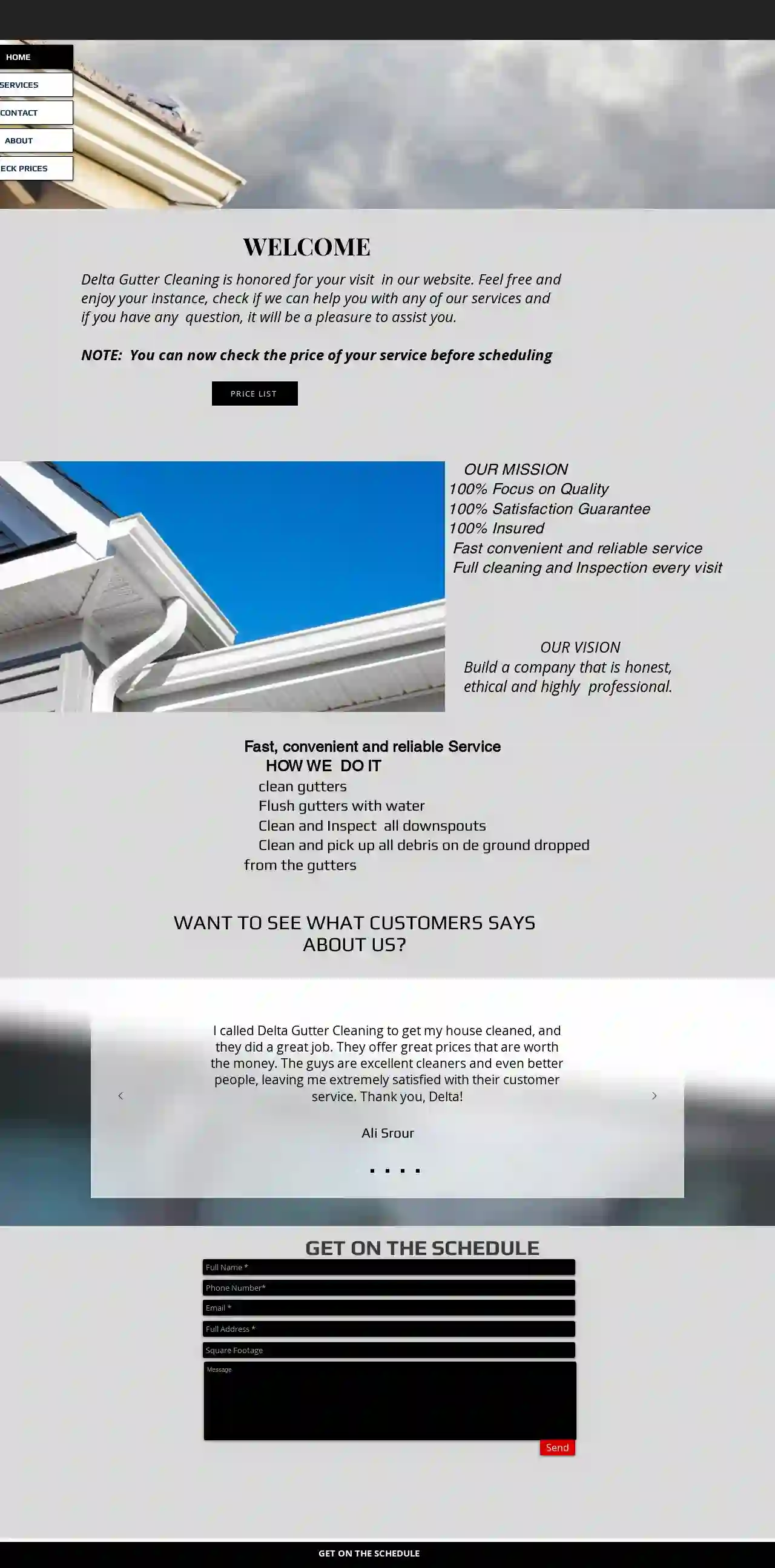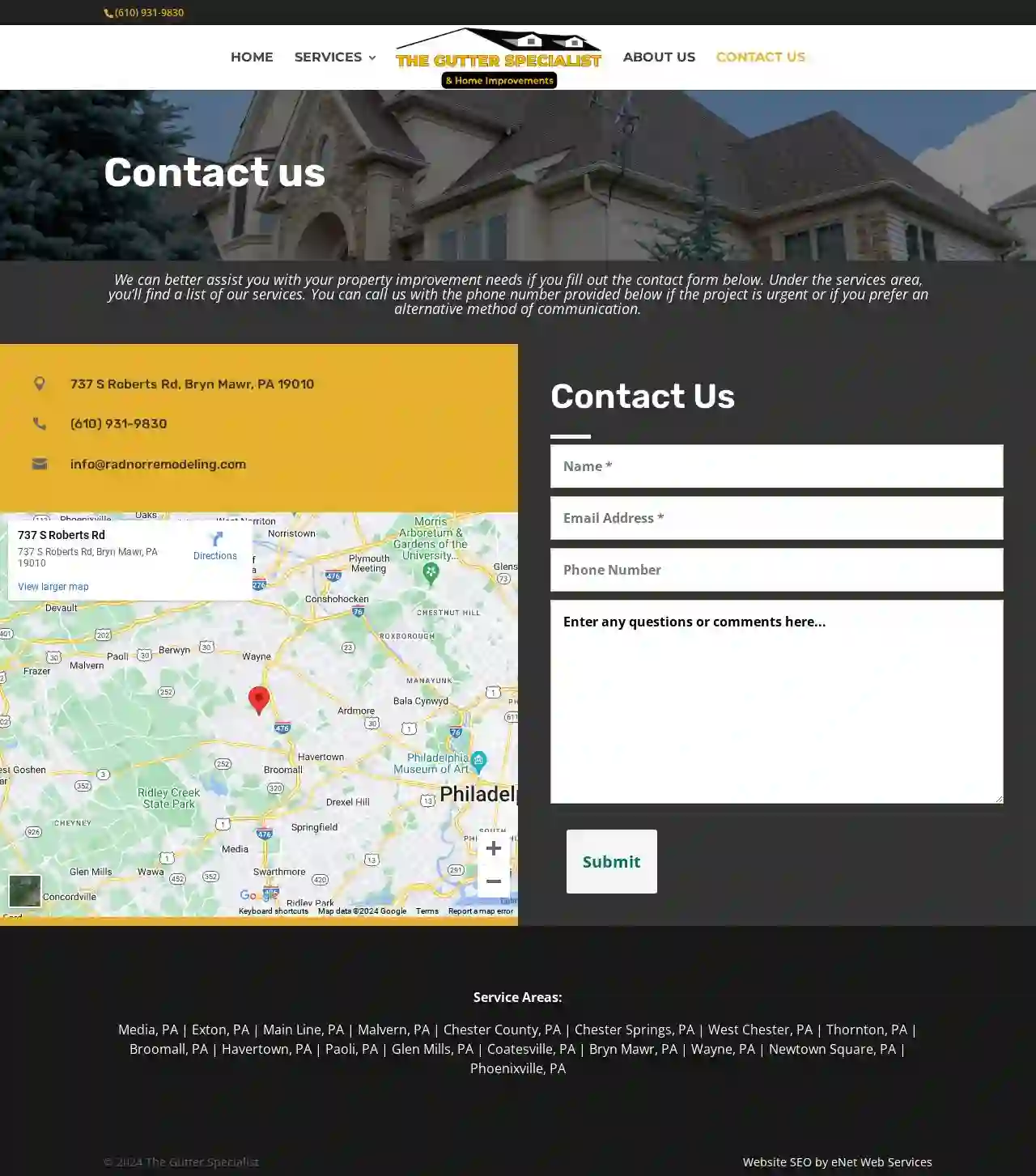Gutter Cleaning Westmont
Best Gutter Cleaning in Westmont
Get multiple Gutter Cleaning quotes for your project today! Compare profiles, reviews, accreditations, portfolio, etc... and choose the best deal.

Stellar Home Services, LLC
510 reviews1234 N 12th St, Suite 100, Allentown, 18015, USStellar Lehigh Valley is a full-service, locally owned and operated, residential and commercial cleaning service serving the Lehigh Valley area. We are committed to providing our clients with the highest quality cleaning services at competitive prices. Our team of experienced and professional cleaners is dedicated to exceeding your expectations. We offer a wide range of cleaning services, including: Residential Cleaning Commercial Cleaning Move-In/Move-Out Cleaning Deep Cleaning Window Cleaning Carpet Cleaning Floor Cleaning Post-Construction Cleaning We use only the highest quality cleaning products and equipment to ensure that your home or business is sparkling clean. We are fully insured and bonded, so you can rest assured that your property is in good hands. Contact us today for a free estimate!
- Services
- Why Us?
Get Quote
Ned Stevens Gutter Cleaning
4.5501 reviewsBroomall, Broomall, PA, USNed Stevens Gutter Cleaning is a trusted and reliable gutter cleaning service provider. With over 50 years of experience, we offer a wide range of services including gutter cleaning, installation, replacement, and repair. Our team of experts uses state-of-the-art equipment and techniques to ensure that your gutters are cleaned and maintained to the highest standards. We also offer additional services such as exterior house washing, deck cleaning, fence cleaning, patio cleaning, power wash - roof cleaning, siding cleaning, walkway cleaning, window cleaning, and mosquito and tick control services. With multiple locations across the United States, we are committed to providing exceptional service to our customers. Contact us today to schedule your appointment and experience the Ned Stevens difference.
- Services
- Why Us?
- Accreditations
- Our Team
- Testimonials
- Gallery
Get Quote
Delta Gutter Cleaning
567 reviewsPhiladelphia, USDelta Gutter Cleaning is honored for your visit in our website. Feel free and enjoy your instance, check if we can help you with any of our services and if you have any question, it will be a pleasure to assist you. Our mission is to provide 100% focus on quality, 100% satisfaction guarantee, 100% insured, fast, convenient, and reliable service, and full cleaning and inspection every visit. We are committed to building a company that is honest, ethical, and highly professional.
- Services
- Why Us?
- Testimonials
- Gallery
Get Quote
All Pro Gutter Guards
584 reviews2220 Maplewood Ave, Willow Grove, 19090, USAll Pro Gutter Guards is a family-owned business that provides gutter guard and gutter cleaning services to residential and commercial customers. We manufacture custom seamless gutters and dispatch our staff and trucks to service homes and businesses in Willow Grove, PA, and the surrounding area. Our team of skilled installers and repair experts offers top-notch installation, repair, and replacement services for gutters, gutter guards, and downspouts. We pride ourselves on providing excellent customer service and ensuring worry-free gutters for our clients.
- Services
- Why Us?
- Gallery
Get Quote
Gutter Guys
53 reviewsPhiladelphia, USTHE GUTTER GUYS® is a full-service rain gutter company with over 500,000 happy customers that has been in business since 1988. We are among the oldest, highly rated and most respected gutter companies in the United States. Our products are made from the highest quality materials available and are installed by experienced, courteous, well-trained craftsmen. We pride ourselves on prompt professional service. You can call our office Monday through Friday during normal business hours and expect a live representative from our company to pick up the phone. We service Pennsylvania, New Jersey, Delaware & Maryland.
- Services
- Why Us?
- Gallery
Get Quote
The Gutter Specialist
737 S Roberts Rd, Bryn Mawr, 19010, USThe Gutter Specialist is much more than just a name. We are proud to provide a wide range of home improvement services. All properties, whether commercial or residential, are serviced by us! Having experience in a wide range of home improvement services has given us a distinct advantage in this industry. It is our responsibility to be your one-stop-shop for home renovation. We excel at helping homes reach their full potential through the roofing, siding, exterior remodeling, and gutters. Do you have an issue or a question? Now is the time to call!
- Services
- Why Us?
- Testimonials
- Gallery
Get Quote
PGH Gutter Cleaning Ultd.
10000, Pittsburgh, 15205, USPittsburgh Gutter Cleaning is a full-service company dedicated to providing professional gutter cleaning, repair, and maintenance to residential and commercial clients in Pittsburgh and surrounding areas. Our team of trained gutter experts knows exactly how to inspect, assess, and remove debris from your gutter system and downspouts. We understand that neglecting your gutters can lead to costly repairs and damage to your home's structure. That's why we recommend cleaning your gutters two or three times a year to prolong the lifespan of your roof, windows, siding, and interior and exterior of your property. We offer a range of services, including gutter cleaning, repair, maintenance, installation, and replacement. We use industry-specific tools and equipment to ensure high-quality workmanship and a perfect working condition for your gutter system. Our 100% satisfaction guarantee ensures you're completely happy with our services. Contact us today to discuss your gutter needs and receive a free quote. We're committed to providing exceptional service and protecting your home from the damaging effects of clogged gutters.
- Services
- Why Us?
- Gallery
Get Quote
The Brothers that just do Gutters - Lehigh Valley
4.8562 reviews1302 N 18th St, Allentown, 18104, USThe Brothers that just do Gutters – A Gutter Contractor in Lehigh Valley, PA and throughout Bucks & Berks County areas! Your premier gutter installation, gutter guard, and gutter cleaning contractor in Allentown, Pottstown, Lehigh Valley and surrounding Bucks & Berks County areas! The Brothers that just do Gutters in Allentown, PA are aware of how crucial it is to make the best possible investments in order to provide you with the best results for your home. Our goal is to establish ourselves as the neighborhood-focused, client-oriented gutter company that provides excellent quality and a wonderful customer experience. We achieve this by being honest, dependable, and sincere with our customers. We examine and share with our consumers both favorable and unfavorable comments about our services. This gives us the opportunity to enhance how we help you in the future, in addition to informing us how we’re doing. As a result, we have regularly delivered 5-star outcomes to local homes in Allentown, PA over the years. If you’re looking for a gutter contractor to handle your gutter cleaning, gutter guards, or gutter installations, we would be happy to assist you. Give us a call right away to schedule a free consultation or learn more about your options and the perks of our gutters.
- Services
- Why Us?
- Our Team
- Testimonials
- Gallery
Get Quote
All Complete Construction
4.777 reviewsGreat Meadows, 5 Danielle Drive, 07838, USAt All Complete Construction, we take pride in our hard work and dedication to detail. We have over eighteen years of experience and can take on any job no matter the size. We value every single customer and treat each job with careful attention. We look forward to working with you soon! We are a family owned business: “I chose to work in this industry because I always had an interest in building. As a young boy, I would spend hours building houses made out of mud in my backyard. But it wasn’t until I watched my father build our home, that I realized construction was my passion.”
- Services
- Why Us?
- Accreditations
- Gallery
Get Quote
GUTTERING BY GARY
4.848 reviewsCherry Hill, USSince 1978, Guttering by Gary has been offering seamless gutters installation, gutter cleaning and repair. They also specialize in the installation of gutter guards. Our mission is to provide you with great service at a great price with 100% customer satisfaction guarantee. Let's discuss your project. Chris Raab, Owner and Navy Veteran, is hands-on and oversees each and every project. Chris and his team manufacture all gutters at your home or business on the day of installation! Licensed and insured, we’re ready to help! We offer a full 30 day warranty on all gutter cleaning jobs, 25-year warranty labor guarantee and 35 year material warranty.
- Services
- Why Us?
- Accreditations
- Our Team
- Testimonials
- Gallery
Get Quote
Over 60,241+ Cleaning Contractors on our platform
Our cleaning service providers operate in Westmont and surrounding areas!
CleaningMatch has curated and vetted Top Janitorial Contractors in and around Westmont. Find the most trustworthy pro today.
Frequently Asked Questions About Gutter Cleaning
- Re-Securing Gutters: Tightening or replacing loose fasteners to secure sagging or misaligned gutters.
- Sealing Leaks: Applying sealant or replacing damaged sections to fix leaks at seams or cracks.
- Replacing Damaged Sections: Replacing damaged sections of gutters or downspouts with new matching pieces.
- Downspout Repair: Reattaching separated downspouts, replacing damaged sections, or installing extensions to direct water further away from the foundation.
- Gutter Guard Installation: Installing gutter guards to prevent debris buildup and reduce maintenance.
- Reputation: Look for companies with positive online reviews and a good track record in the industry.
- Experience: Choose a company with experienced gutter cleaners who are familiar with various gutter types and cleaning methods.
- Licensing and Insurance: Ensure the company is licensed, insured, and bonded to protect you from liability.
- Pricing: Get quotes from multiple companies and compare their pricing. Ensure the quotes are detailed and transparent.
- Services Offered: Check if the company offers additional services like gutter repair, gutter guard installation, or downspout cleaning.
- Customer Service: Choose a company that is responsive to inquiries, provides clear communication, and offers excellent customer service.
- Aluminum: A popular choice due to its affordability, durability, and resistance to rust. Available in seamless and sectional varieties.
- Vinyl: Lightweight, inexpensive, and easy to install. Less durable than aluminum and can become brittle in extreme temperatures.
- Steel: Strong and durable but prone to rust if not galvanized or coated.
- Copper: High-end and aesthetically pleasing, known for its longevity and resistance to corrosion. More expensive than other gutter materials.
- Zinc: Durable and long-lasting, with a distinctive patina that develops over time. More expensive than aluminum but less expensive than copper.
- Experience: 'How long have you been in the gutter cleaning business?'
- Licensing and Insurance: 'Are you licensed, insured, and bonded?'
- Cleaning Methods: 'What gutter cleaning methods do you use, and what type of equipment do you have?'
- Gutter Inspections: 'Do you perform a thorough inspection of the gutters before and after cleaning?'
- Pricing: 'How do you price your gutter cleaning services? Do you charge by linear foot, number of stories, or a flat rate?'
- Guarantees: 'Do you offer a satisfaction guarantee or warranty on your work?'
- References: 'Can you provide references from previous clients?'
What are some common gutter repairs?
A professional gutter repair company can assess your gutters and recommend the most appropriate repairs to restore their functionality and prevent water damage.
How do I choose the right gutter cleaning service?
By carefully evaluating these factors, you can select a gutter cleaning service that meets your needs and provides reliable and professional results.
What are the different types of gutter materials?
The best gutter material for your home depends on your budget, climate, and aesthetic preferences. Consult with a gutter professional to determine the most suitable option for your needs.
What should I ask a gutter cleaning company before hiring them?
Asking these questions can help you choose a reputable and reliable gutter cleaning company.
What are some common gutter repairs?
- Re-Securing Gutters: Tightening or replacing loose fasteners to secure sagging or misaligned gutters.
- Sealing Leaks: Applying sealant or replacing damaged sections to fix leaks at seams or cracks.
- Replacing Damaged Sections: Replacing damaged sections of gutters or downspouts with new matching pieces.
- Downspout Repair: Reattaching separated downspouts, replacing damaged sections, or installing extensions to direct water further away from the foundation.
- Gutter Guard Installation: Installing gutter guards to prevent debris buildup and reduce maintenance.
A professional gutter repair company can assess your gutters and recommend the most appropriate repairs to restore their functionality and prevent water damage.
How do I choose the right gutter cleaning service?
- Reputation: Look for companies with positive online reviews and a good track record in the industry.
- Experience: Choose a company with experienced gutter cleaners who are familiar with various gutter types and cleaning methods.
- Licensing and Insurance: Ensure the company is licensed, insured, and bonded to protect you from liability.
- Pricing: Get quotes from multiple companies and compare their pricing. Ensure the quotes are detailed and transparent.
- Services Offered: Check if the company offers additional services like gutter repair, gutter guard installation, or downspout cleaning.
- Customer Service: Choose a company that is responsive to inquiries, provides clear communication, and offers excellent customer service.
By carefully evaluating these factors, you can select a gutter cleaning service that meets your needs and provides reliable and professional results.
What are the different types of gutter materials?
- Aluminum: A popular choice due to its affordability, durability, and resistance to rust. Available in seamless and sectional varieties.
- Vinyl: Lightweight, inexpensive, and easy to install. Less durable than aluminum and can become brittle in extreme temperatures.
- Steel: Strong and durable but prone to rust if not galvanized or coated.
- Copper: High-end and aesthetically pleasing, known for its longevity and resistance to corrosion. More expensive than other gutter materials.
- Zinc: Durable and long-lasting, with a distinctive patina that develops over time. More expensive than aluminum but less expensive than copper.
The best gutter material for your home depends on your budget, climate, and aesthetic preferences. Consult with a gutter professional to determine the most suitable option for your needs.
What should I ask a gutter cleaning company before hiring them?
- Experience: 'How long have you been in the gutter cleaning business?'
- Licensing and Insurance: 'Are you licensed, insured, and bonded?'
- Cleaning Methods: 'What gutter cleaning methods do you use, and what type of equipment do you have?'
- Gutter Inspections: 'Do you perform a thorough inspection of the gutters before and after cleaning?'
- Pricing: 'How do you price your gutter cleaning services? Do you charge by linear foot, number of stories, or a flat rate?'
- Guarantees: 'Do you offer a satisfaction guarantee or warranty on your work?'
- References: 'Can you provide references from previous clients?'
Asking these questions can help you choose a reputable and reliable gutter cleaning company.